Dental implantation is a modern effective technique that allows you to replace lost teeth by artificially implanting an implant into the gum. Artificial roots are made from a special titanium alloy. There are various methods of implantation, indications for surgery and contraindications.
Dental implantation is a relatively new technique that allows for the implantation of artificial roots in the gums in the form of implants. After that, a crown or an artificial tooth is placed on the base, which outwardly practically does not differ from the present. Implantology received its development more than 30 years ago and is currently popular.
There are two types of implantation according to the method and time of execution:
- One-stage;
- Two-stage.
One-stage dental implantation takes only 1-2 weeks and requires 2-4 visits to the dentist. Its attractiveness lies in the fact that a new tooth is formed quickly, and no surgical intervention is required. It is also called seamless or minimally invasive.
The second option takes about six months, since first a new root is introduced into the gum - an implant, then prosthetics are performed. This is a surgical procedure that has its own advantages and disadvantages. The main positive aspects of two-stage implantation are excellent cosmetological effect, long service life of new teeth. The indications for this method of implantation are wider; it can be carried out in cases where a one-stage implantation is impossible.
You can consult in more detail what dental implantation is, types and prices at the dental clinic.
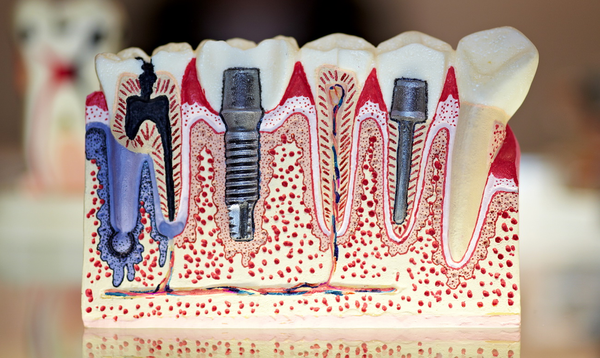
Indications and contraindications
To carry out dental implantation, certain indications are required, currently this procedure is done in the case when other orthopedic methods do not lead to a result. The possibility of implantation is also determined by the absence of contraindications.
The indications for the operation are as follows:
- The absence of one tooth with healthy adjacent teeth (defect in the dentition);
- The absence of two or more teeth in a row;
- The absence of the last elements of the dentition, when it is impossible to apply a different type of prosthetics;
- As an alternative to removable dentures in the absence of teeth;
- Inability for various reasons to wear removable dentures (hypersensitivity, gag reflex when putting on);
- Pain in the absence of functional occlusion.

Contraindications can be of two types - absolute and relative. The second list includes reasons that can be eliminated. Absolute contraindications completely exclude the possibility of an implantation operation. These include:
- Diseases of the blood;
- Mental illness;
- Oncology;
- Diseases that interfere with the growth and development of connective tissue;
- Insulin-dependent diabetes mellitus;
- Tuberculosis;
It is impossible to carry out operations during pregnancy, inflammation of the oral cavity, with alcohol and drug addiction. Dental implantation is impossible in cases of existing contraindications for any surgical intervention, as well as during periods of depletion of the body, low immunity.
How the implantation process takes place in stages
Two-stage implantation includes certain step-by-step actions. Before carrying out the operation, it is necessary to undergo a consultation and pass the necessary tests, which will be prescribed by the dentist.
Consultation, panoramic and 3D images and tests
This stage plays a decisive role, at this time the type of adentia is examined (how many teeth are missing), the possibility of an operation is determined. Based on the results of the examinations, the choice of the method of prosthetics is made, the type, size, shape, design of the implants are determined.
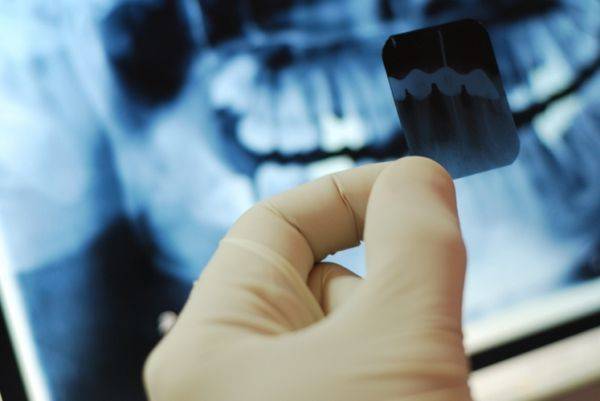
Preparation includes the elimination of all temporary contraindications to surgery - treatment of damaged teeth, oral diseases, and other reasons that may interfere with the implantation process.
Surgical intervention
At this stage, the bone bed is prepared for the installation of implants. To do this, an incision is made in the gum, its stratification is performed, and a place is formed for a new artificial root. For this, special tools are used.
Then an implant is installed in the resulting bed, which is protected by a screw cap. This allows you to protect it from tissue ingrowth and ingestion of food. After placing the implant, the gum is sutured.
Implant engraftment process
For the complete engraftment of the implant, it takes from 1.5 to 6 months. If the operation is performed on the lower jaw, 2-3 months are enough, on the upper - up to 6. The duration of this stage depends on the physiological characteristics of the person. For the period of implantation, a cosmetic tooth is temporarily placed.
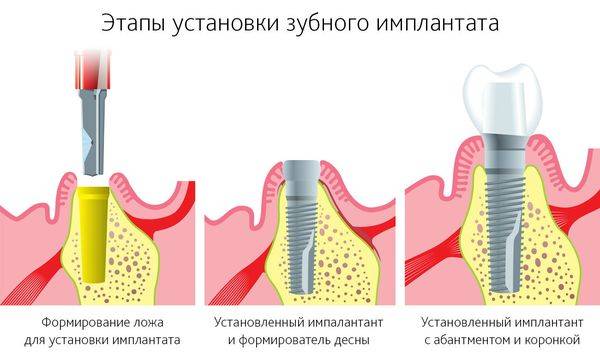
After the implantation of the teeth and the engraftment of the implant, the gum is cut again and a "gingiva former" is installed. It is necessary in order to create a base for an artificial tooth. The duration of its formation is 1-2 weeks.
After removal of the former, when the implant has completely engrafted, the abutment is placed. It is the link between the implant and the prosthesis. After a week, you can start prosthetics.
The last stage: prosthetics
An orthopedic dentist takes impressions, fabricates and installs a crown on the implant. The main goal of this stage is the installation of a denture. According to the principle of fixing an artificial tooth, there are removable, combined, conditionally removable and fixed prostheses. They are made by an orthopedic doctor using casts. The crown is placed on the implant.
On the website of the clinic, you can see in more detail how dental implantation is performed - photo in stages.
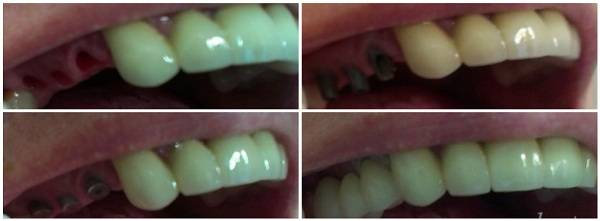
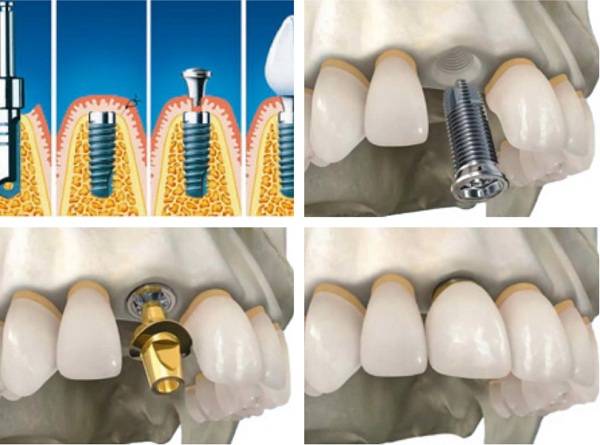
Immediate basal implantation
It is carried out after tooth extraction - immediately, or after a certain time, until the hole heals - delayed. Its advantages are:
- Lower cost, since one operation includes three steps at once: removal of an old tooth, insertion of an implant and a healing cap;
- No surgery is required that leads to the loss of soft tissue and jawbone;
- It is easier to correctly install the implant and control its position;
- The possibility of installing a larger implant than with a delayed operation;
- More than 99 percent of such operations are successful.
The decision to carry out a one-time implantation is made after the extraction of the tooth, for this the hole is examined. A positive result is guaranteed if the removal operation is carried out carefully and atraumatically, and the tissue around is not destroyed by inflammation.
Immediate implantation of teeth or a whole series of teeth is possible in the case when it is necessary to urgently restore the front incisors.
When may bone grafting be required
When carrying out "turnkey" dental implantation, the restoration (augmentation) of bone tissue is often required. This operation is called bone grafting. Already after 3 months after tooth extraction with the root, bone tissue atrophy occurs, since the load ceases. After a year, this process reaches its peak.
For tooth augmentation, it is better to contact an implantologist immediately after extraction. Otherwise, you will have to resort to bone grafting. But this is not always required, in any case, the decision on its implementation is made by the dentist. Since there are cases when, after a long absence of a tooth, the bone tissue remains unchanged. Most often, there are problems with bone atrophy or displacement of adjacent teeth.
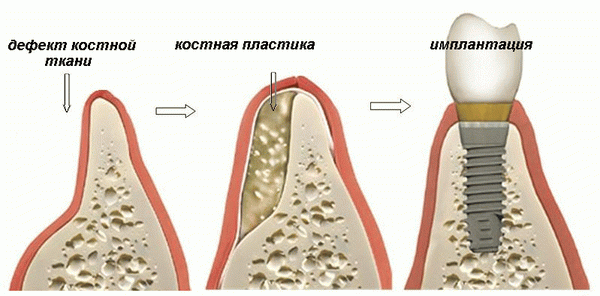
The frontal part of the lower and upper jaws requires bone grafting more often, since a sharp and thin alveolar ridge is quickly formed here. The plastic of this part is rather difficult, since it is required to achieve a good cosmetic result.
It is difficult to work with the lateral sections of the upper jaw due to the fact that the maxillary sinuses are located here. Bone grafting of this section is called, there are open and closed types of this operation.
Before deciding on an operation, you should understand that dental implantation has contraindications and possible complications.
Contraindications and complications
The following reasons are considered complete contraindications to implantation:
- Oncological diseases, including at the stage of treatment and after a course of therapy;
- Diabetes mellitus that does not lend itself to drug correction;
- Diseases of the central nervous system, including epilepsy;
- Teeth grinding during sleep (bruxism);
- Hematopoiesis problems, bleeding disorders;
- Immunity disorders of various etiologies;
- Lupus erythematosus;
- Bone tuberculosis;
- Arthritis.
With regard to relative contraindications, many implantologists believe that they do not exist. If there are no compelling reasons why implantation is contraindicated, other reasons can be eliminated by the efforts of the patient and the doctor.
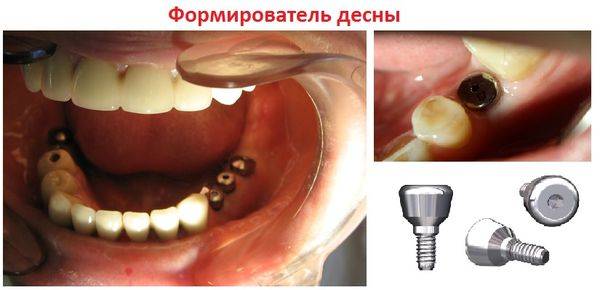
The dentist prepares the oral cavity for the operation so that it is in such a state that guarantees a successful result in the installation of implants and gives a good forecast for their future use.
Before the operation, you should heal caries, eliminate problems with the gums, stop smoking, which provokes the development of foci of infection. A set of measures is carried out in conjunction with a doctor.
In the postoperative period, some complications may occur that must be eliminated. The survival rate of the implant depends on the physical condition of the patient, his physiological characteristics. Since a foreign body is implanted, which is surgically placed into the gum, it is rather difficult to predict in advance how the procedure will go.
The following types of complications after dental implantation are most common: :
- Pain and bleeding;
- Inflammation of soft tissues around adjacent teeth%
- Hematomas near the site of intervention;
- The seams come apart.
The most significant complication is implant rejection.
To avoid negative consequences, it is necessary to strictly follow all the recommendations of the attending physician, monitor oral hygiene. According to reviews, most implantation operations are successful; if all conditions are met, serious complications can be avoided. Allergy to dentures is very rare.
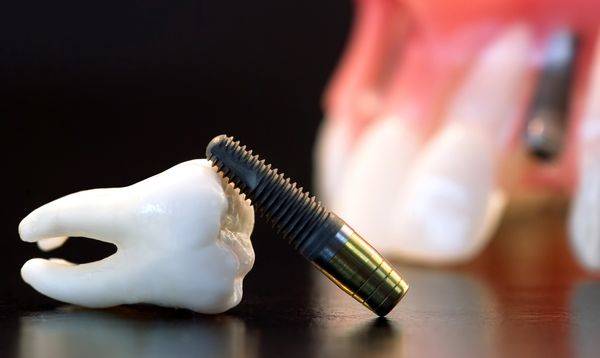
After all stages of the operation have been carried out and prostheses are inserted, there is no need to visit the dentist. For preventive purposes, it is worth visiting the clinic to identify possible deviations and other dental health problems.
Can the implant fail to take root?
Implants are made of titanium, which is considered an absolutely safe material for human health. At the same time, there is a small risk of its rejection and the occurrence of problems with implantation. It depends on several factors, the most important of which are:
- Type of implants;
- Implantologist's professionalism;
- Individual characteristics of the body, in particular, the state of the human immune system, or the presence of health problems.
Practice shows that they take root in 98 percent of cases, which is ensured by the use of advanced technologies for medical intervention, high-quality materials, and state-of-the-art equipment.
Before their installation, the patient undergoes a full examination, which ensures a positive result and negates the risks of implant rejection. The clinic gives a certain guarantee for each installed artificial tooth.
Implantation cost
The cost of a dental implantation operation depends on many factors: the cost of the implant, the manufacturer, the qualifications of the doctor, the clinic to which the person applies. For example, an Israeli-made economy-class implant, together with the installation, will cost about 15,000 rubles.
In the middle price category, implants made in France and Germany can be distinguished, the cost with installation will be about 30-35 thousand rubles per tooth. For premium class items, you will have to pay from 50,000 rubles. It should be understood that the cost will include the creation of a crown on a tooth. Depending on the material of manufacture, the price for a crown varies from 10 to 35 thousand rubles.
You can find out more specifically at the clinic where these operations are performed.
Most often used types of implants
It is important to choose high-quality implants for installation. The wrong choice can provoke poor engraftment, which will lead not only to painful sensations for a long period of time, but also to the rejection of a foreign body.
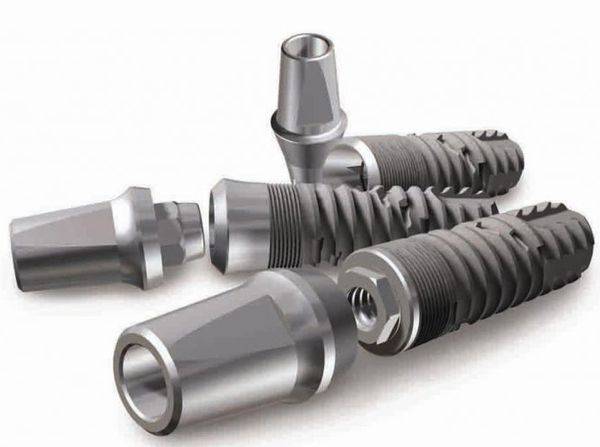
Modern systems for the most part consist of good materials that are not foreign to bone tissue and cells of the human body. It is better to choose reliable products from trusted companies that have proven themselves well.
The following types of implants are in greatest demand:
- German firm
The development of a unique technology, which was carried out by German scientists, enjoys well-deserved popularity in most countries of the world. It is distinguished by high quality, reliability, versatility.
The basis for the prosthesis is a titanium screw, which has a safe thread, thanks to which it is securely fixed in the human jaw. It is a functional and safe replacement for the real root. The advantage of the implant is the fact that it can be used for prosthetics of several teeth at once. To create a fixed prosthesis in the absence of teeth, only a few elements are required.
XIVE implants have a 5-year warranty. Dental implantation takes place in two stages.
- Technology from Nobel Biocare
These implants are leading the dental market. Their popularity can be easily explained, this company was one of the first to start performing such operations. Thanks to colossal experience, the product has been used for more than 40 years, and good statistics, this company has earned a reputation, Nobel Biocare implants are modern and high quality.
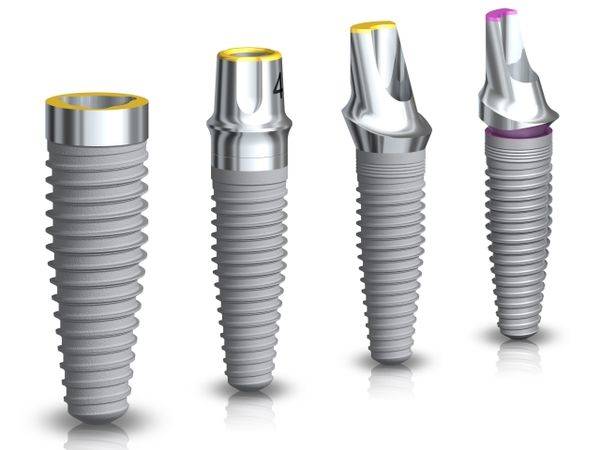
Thanks to innovative technology, dental implantation takes place in one stage. The company's product allows to increase the survival rate and strengthen the bone tissue around the new artificial root, which prolongs the longevity of the implant. The guarantee for the installation of these elements is up to 10 years.
Among the premium segment, the following companies can be distinguished:
- BranemarkSystem- collapsible options are represented by three types of implants, which are in the form of a cylinder or a cone with a double thread. This allows you to significantly increase the survival rate, the average price for a product is 50-70 thousand rubles;
- Swedish system OsseoSpeed TX offers Astra Tech products with a wide selection of pin diameters and lengths, is of high quality and relatively low cost - 35-45 thousand per tooth;
- Swiss company Straumann manufactures products with a lifetime quality guarantee, this company has been known in the dental services market for a very long time. The cost of Straumann implants varies between 40-50 thousand rubles.
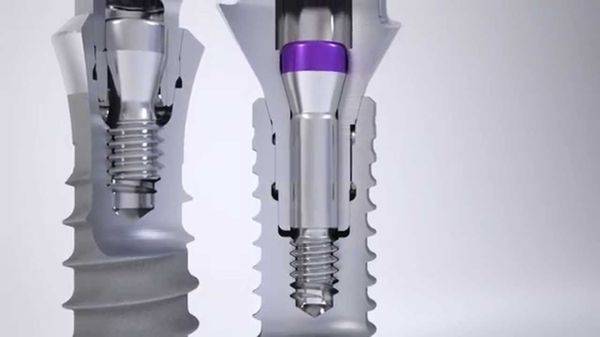
In the mid-price segment, the products of Dentsply Friadent with the Ankylos system stand out, which have special methods of connecting the artificial root to the abutment. This allows for a long time to avoid the expansion of the border between the crown and the gum. The cost of installing one tooth is about 30 thousand rubles.
The German company Schutz presents to the attention of consumers systems of various sizes, both prefabricated and non-demountable. The American company produces Zimmer implants, which are designed for implantation into thin bone. The average cost starts from 18 thousand rubles.
Available for clients of dental clinics and products of Russian production, which are manufactured from German components. The cost of implants of the domestic company Niko is 23-28 thousand per tooth. And the price of Israeli technologies, which are also in demand in Russia, varies between 15-25 thousand rubles.
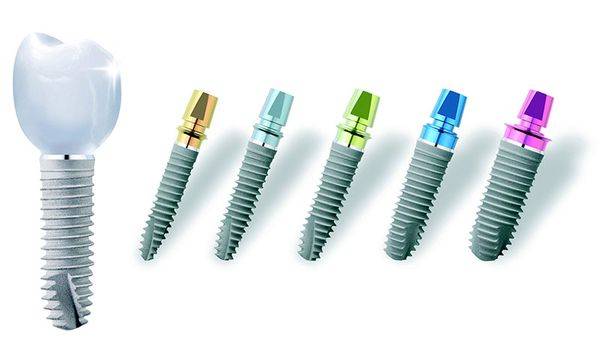
There are also budget options that are used in implantology. These are systems made in Russia, Ukraine, Belarus, the cost of tooth implantation is low. Installation of one tooth will cost from 7 to 17 thousand rubles. But these systems do not have guarantees of durability and reliability, which are given by foreign companies.





